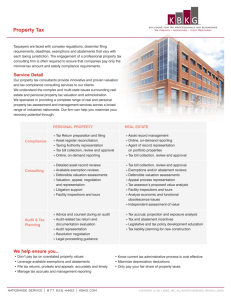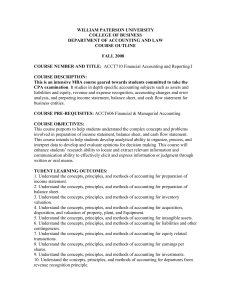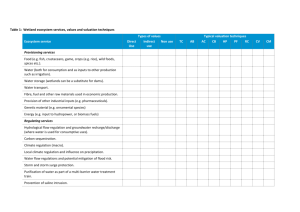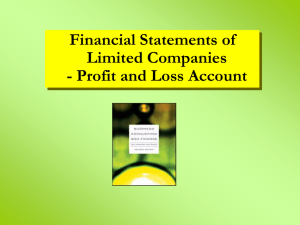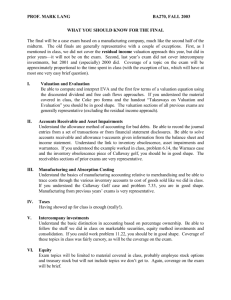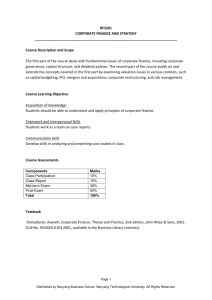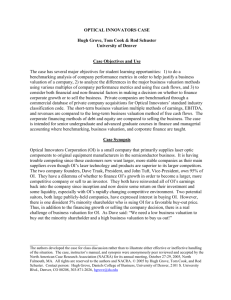October 7, 2009: Don Nalley
advertisement
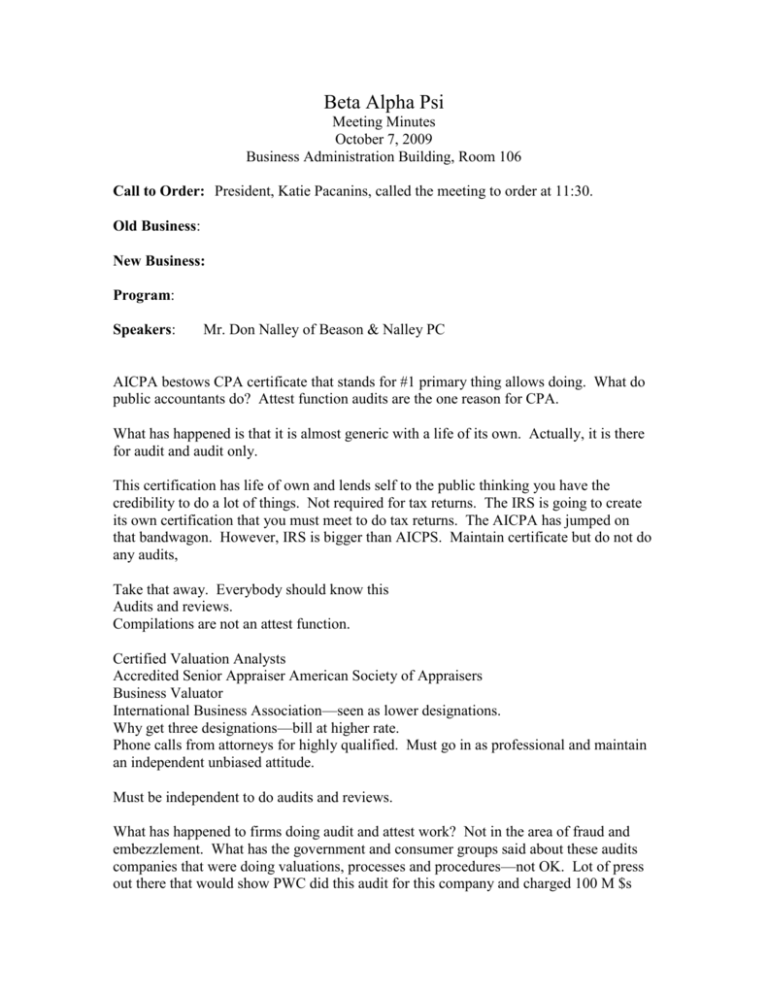
Beta Alpha Psi Meeting Minutes October 7, 2009 Business Administration Building, Room 106 Call to Order: President, Katie Pacanins, called the meeting to order at 11:30. Old Business: New Business: Program: Speakers: Mr. Don Nalley of Beason & Nalley PC AICPA bestows CPA certificate that stands for #1 primary thing allows doing. What do public accountants do? Attest function audits are the one reason for CPA. What has happened is that it is almost generic with a life of its own. Actually, it is there for audit and audit only. This certification has life of own and lends self to the public thinking you have the credibility to do a lot of things. Not required for tax returns. The IRS is going to create its own certification that you must meet to do tax returns. The AICPA has jumped on that bandwagon. However, IRS is bigger than AICPS. Maintain certificate but do not do any audits, Take that away. Everybody should know this Audits and reviews. Compilations are not an attest function. Certified Valuation Analysts Accredited Senior Appraiser American Society of Appraisers Business Valuator International Business Association—seen as lower designations. Why get three designations—bill at higher rate. Phone calls from attorneys for highly qualified. Must go in as professional and maintain an independent unbiased attitude. Must be independent to do audits and reviews. What has happened to firms doing audit and attest work? Not in the area of fraud and embezzlement. What has the government and consumer groups said about these audits companies that were doing valuations, processes and procedures—not OK. Lot of press out there that would show PWC did this audit for this company and charged 100 M $s and did xxx consulting work and did 900M $. Had to divest the consulting work. There are consulting firms in the market that used to be part of CPA firms. Divesting and creating niche focuses in the industry. As a small accounting firm we have the niche of egovernment contractors. We still do audits, tax, consulting, business valuation, look like one of those old traditional CPA firms. Nobody has said you can’t have this group and do audit too. We are headed there. May slow and get pushed out but are headed to the purity you will do what you do. Of course you can consult in area of business valuations. Business valuation is huge and exploding. Historically from GAPP basis, entries are cost based. That is changing. Fair value concept of accounting. Might have seen very little so far. Now there is move to adopt international accounting concepts as apposed to US GAAP. They have been fair value for a long time. Book because statements of accounting principles say that must record some things as fair value, need for business valuation analysis just went up. Auditors don’t want any part of that. Want somebody with business valuations with letter and work papers to say what this should be. There is a need for business valuation. Huge area is employee benefit plans. Business growing with good product at some point will have to put in equity based compensation plan. As soon as implemented there will be valuation issues year in and year out. We spend lot of time there and will do 30 to 40 in a typical year. Most are based on equity type compensation plans. They can be regular incentive stock options or geared just to top management. Can get some type of derivative. Not out there. We calculate growth incentive sharing plan, just value company each year and award individuals units of that growth. Not shares just units of value. Getting percent of growth in value of company. Not typical demand—estate tax returns, divorce issues, lot more going on and really creating focus in the industry and increased demand in the area of valuation. Model for business valuation in economics course at UAHuntsville. Chapter Dorla Evans sent that discounted income approach. In Business Valuation there are lots of ways to skin a cat. We have to read, just like tax focus reads tax journals, every day. Otherwise we would be out of touch in a very short period of time. A number of trade journals discussing methodology differences, court cases getting settled, analysis of court cases. Reading all time, generally, can be simplified. Try to establish value of invest asset. What valuing is very specific to given purpose, might be minority percent in the company, one share at the time. Always very specific, investment asset. What are trying to get when trying to derive the fair market value of a particular asset—cash flow generated in the future and the present value of the cash flow. Lot of ways to try to get there. Most commonsense way is use all the cash flows and determine the present value stream potentials. Other ways, Price to earnings. PE is 10—what does that say? Says the price is 10 times whatever the earnings are. Price is value, E $5, PE $10, FMV is $50. This is called comparable methodology in Business Valuation. Look at that too. Always looking for guidelines. What is FAS 157? The authoritative guide on valuing an asset. Doesn’t require that any assets be valued. Defines method of getting value. What does it say? Find a comparables first. Easiest and makes most sense. If you believe that is not a good value must move on to other things. Discounted cash flow must make lot of assumptions, as soon as you make statement, big assumptions. See models with future value for up to 20 years. So easiest thing is to find the PE and use that. What if apply FAS 157 and looking at 10M business. Do I have any public traded comparables? Can you compare $10 million company to $1 billion business? Have ruling 5960 that says have to do that. So have to go out and try to search public companies. Try to take some other measures to create some comparability to make that happen. At the end of the day it isn’t that extreme because if somebody is coming in to buy a particular small business. We may have large company looking to by smaller business. How do they come up with here’s what I will pay. Common sense in looking at comparable numbers. Can be a stretch. Lot of detail. I think it is a very exciting, full of judgment, thought, work and continuous learning, business valuation is not analytical crank out. Profession that is young without great number of people only two accredited senior appraisers in Huntsville, only four in the whole state. There are many CPAs in Huntsville--good organizations, good training, good continuing education. Food for thought, might want to consider. One other area in business valuation—client base. This is the area discussed in Dorla’s Economics chapter. Promoting thought process of using value to assist in growing any particular business. So thought addressed what is the most important factor to consider in driving a particular. Historically—profits. May be only one chapter in valuation. What is really the most important thing for a business to focus on? Value! To get clients thinking that way, we say, “What is the purpose of a business?” We get many answers, e.g. “to work,” “check,” etc. What is a business—an investment asset. Not consumption item. Not going to buy it or any part of it if don’t think it will return cash. What is purpose of investment asset? To return cash. Not living in this business, purpose of business is to sell it! Try and think if you want to sell a house, what will you do to get the highest and best price for house—make sure it is in good shape. Want to sell a business—same thing. To sell and to make it look good what do people look at? Financial statements and past value. If want business to look good to somebody don’t know, don’t know who the buyers are. Can be sure they will ask for financial statements, projections, resumes of people in company. That’s the picture of this business; most information is what has occurred and what is occurring right now. Think that way, starts to make sense that trying to create a smooth operational company, solid growth pattern, not spurts, really looking at trying to create more of a long term approach to running business. Look back of span of time, 3-5 years. Revenue growing every year, get resumes of people, solid experience, kick wheel and talk to some of people, systems work good, everybody knows what they are doing, That’s what we are doing when we ask client what purpose of business is? Decide what steps are to get there so can have smooth company walking up flight of steps one step at time. Profits are today oriented. Focus exclusively on profits for year, can be detrimental for next year. Everybody has got to make profits but a company focused on value growth will make profits too and will be consistent, the system will work, good people, long term concepts. Lot of time with clients doing value planning for the business. Background of business valuation. An area that is not really taught in colleges today. Not taught as degree. Have to get this after get out of school. Will start seeing as a degree soon. Similar to financial planning. Financial plan has 10-15 years lead on business valuation. Predict next 10-15 years we will see leading business colleges offering degree in business valuation Questions: 1) The US might adopt International Standards. When do you see that happening? Is the CPA firm specialization how it is internationally? When I started with PWC they were just getting into consulting. Sold for about $15 billion a few years ago. It is now primarily an attest and tax company not long before these CPA firms have to spin out the last remaining thing—tax. That’s deemed conflict of interest. Lot of big 4 companies don’t have tax groups anymore. That hasn’t filtered down to local level yet. We can do audit of closely held business and can do a shareholder’s tax returns. How fast are we moving toward international standards, we might have been close if economic conditions hadn’t changed. If hadn’t forced fair value accounting upon country, wouldn’t have this problem. Not our problem, got bad assets, blame whatever is responsible for Do we really want to go there? What will reheat that topic? 2) Certifications requirements – CVA took two years 4 sets of courses with tests after each one and a specified level of experience ASA took about 9 years. Various levels of tests, panel didn’t know, requirement expertise requirement – 5 full time years. With tax and business valuation had to work more years to have 5 full years time By being CVA and ASA filled form out and got ABV. 3) Finance major—what other steps would need to get into the career. Will have to get accounting background I don’t have as finance major. Brokerage houses must think value on a daily basis. Other designation in finance CFA that perform valuation but designation is not designed to prepare formal business valuation. That is one area. See valuators from finance and CFA background. CFA is as hard to get as CPA. Had 3 different attorney associates who passed the bar exam but CPA was harder. CPA about 10% pass rate. Don’t have to have CPA to practice but I won’t drop because of world perception of CPAs. A main reason is route to valuation is access all business that the CPA firm works with. Without being part of CPA firm it is harder to get clients. 3) Want to, as finance major, apply to firm such as yours for something like you do, how do I apply? Same way as with any firm; do background. I have trained 3 different valuators in firm but haven’t hired anybody outside. Get into industry before you take on this designation. Can’t hire out of college and become professional business valuator overnight. 4) Who are the consumers? Buyers, sellers, primary consumers are business owners implementing equity based plan to grow the business (70%). By the way, if you want to make money, what is one of the first things you should decide you need to know? Buy low-sell high. Everybody should have some concern as how to value an investment asset. The return on college education is unbelievable. Whole lot of you will earn several million $$ in your career with an education cost of maybe 50K. Presentation of Certificate of Appreciation. Meeting Adjourned: 12:20. Thanks for coming. Rozella Coggin, Recording Secretary Katie Pacanins, President
